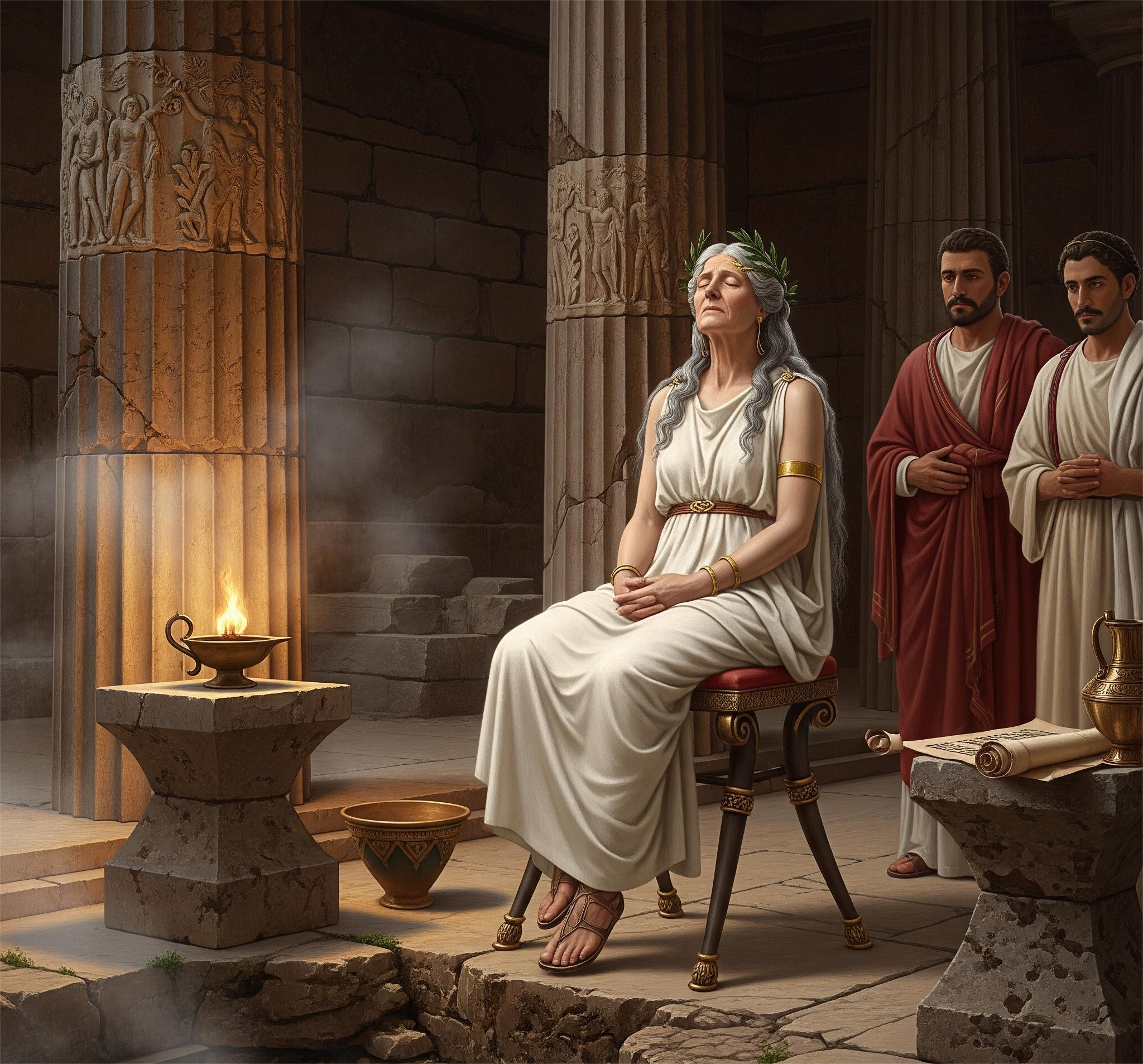High on the slopes of Mount Parnassus, nestled in the rocky heart of central Greece, stood one of the most sacred sites of the ancient world: Delphi. Revered as the center of the world, Delphi was home to the Oracle of Apollo, where a priestess known as the Pythia delivered cryptic messages believed to come straight from the god himself. Far more than just a mystical tradition, the Oracle of Delphi played a pivotal role in religion, politics, and daily life throughout the Greek world.
The Site of Delphi: Navel of the World
According to legend, Zeus released two eagles from opposite ends of the Earth to find its center. They met at Delphi, marking it as the omphalos—the navel of the world. This symbolic stone still sits at the site, which housed:
The Temple of Apollo, where the Pythia gave her prophecies,
Treasuries from city-states that sought favor or thanked the god,
A theater, gymnasium, and stadium for the Pythian Games, second only to the Olympics.
The sanctuary became a hub for both pilgrimage and diplomacy, blending spiritual authority with political influence.
The Pythia: Voice of Apollo
The Pythia was a high priestess chosen from among local women, often older and of respectable reputation. Once inducted, she entered a sacred trance to channel Apollo’s will. This ritual likely took place once a month during the god’s active season.
Historical descriptions suggest the process involved:
Sitting on a tripod over a chasm in the temple floor,
Inhaling sweet-smelling vapors (possibly from natural gas emissions),
Entering a trance-like state and uttering ecstatic or poetic phrases,
Priests then interpreting her words into structured responses.
While some ancient and modern scholars debate the presence of hallucinogenic gases, the effect on visitors was undeniable. The Pythia’s authority was rarely questioned, even when her words were ambiguous.
Oracles and Greek Politics
The Oracle of Delphi was far more than a religious institution—it was a political powerhouse. City-states, kings, and foreign rulers traveled great distances to consult the Pythia before:
Launching military campaigns (e.g., King Croesus of Lydia famously misunderstood an oracle before attacking Persia),
Establishing colonies (Delphi guided the founding of cities like Cyrene in North Africa),
Making major policy decisions, such as legal reforms or alliances.
Delphi's central position allowed it to act as a neutral arbiter, and its priests carefully maintained its reputation for impartiality. Even rival Greek city-states often respected and honored its counsel, giving the sanctuary an almost diplomatic function in the ancient world.
Prophecy and Interpretation
Delphic oracles were known for their ambiguity, often phrased to allow multiple interpretations. Famous examples include:
"You will destroy a great empire"—Croesus assumed it meant Persia; it turned out to be his own.
"If you fight with all your might, you will conquer"—but whose conquest?
This poetic vagueness protected the oracle’s credibility while encouraging reflection and analysis. The Greeks valued such nuanced insight, seeing truth not as black-and-white, but as something revealed through divine mystery.
Delphi's Decline and Legacy
Delphi's influence declined with the rise of Christianity and the fall of pagan worship under the Roman Empire. Emperor Theodosius I officially closed the sanctuary in the 4th century CE. Earthquakes and looting further devastated the site.
Yet, its spiritual and cultural impact endures:
Delphi is now a UNESCO World Heritage Site,
The term “Delphic” still denotes enigmatic or cryptic speech,
And the oracle’s legacy continues to inspire books, films, and philosophy.







